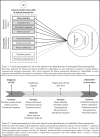Exploring Patients' Perceptions About Chronic Kidney Disease and Their Treatment: A Qualitative Study
- PMID: 37226037
- PMCID: PMC10208195
- DOI: 10.1007/s12529-023-10178-x
Exploring Patients' Perceptions About Chronic Kidney Disease and Their Treatment: A Qualitative Study
Abstract
Background: Unhelpful illness perceptions can be changed by means of interventions and can lead to improved outcomes. However, little is known about illness perceptions in patients with chronic kidney disease (CKD) prior to kidney failure, and no tools exist in nephrology care to identify and support patients with unhelpful illness perceptions. Therefore, this study aims to: (1) identify meaningful and modifiable illness perceptions in patients with CKD prior to kidney failure; and (2) explore needs and requirements for identifying and supporting patients with unhelpful illness perceptions in nephrology care from patients' and healthcare professionals' perspectives.
Methods: Individual semi-structured interviews were conducted with purposive heterogeneous samples of Dutch patients with CKD (n = 17) and professionals (n = 10). Transcripts were analysed using a hybrid inductive and deductive approach: identified themes from the thematic analysis were hereafter organized according to Common-Sense Model of Self-Regulation principles.
Results: Illness perceptions considered most meaningful are related to the seriousness (illness identity, consequences, emotional response and illness concern) and manageability (illness coherence, personal control and treatment control) of CKD. Over time, patients developed more unhelpful seriousness-related illness perceptions and more helpful manageability-related illness perceptions, caused by: CKD diagnosis, disease progression, healthcare support and approaching kidney replacement therapy. Implementing tools to identify and discuss patients' illness perceptions was considered important, after which support for patients with unhelpful illness perceptions should be offered. Special attention should be paid towards structurally embedding psychosocial educational support for patients and caregivers to deal with CKD-related symptoms, consequences, emotions and concerns about the future.
Conclusions: Several meaningful and modifiable illness perceptions do not change for the better by means of nephrology care. This underlines the need to identify and openly discuss illness perceptions and to support patients with unhelpful illness perceptions. Future studies should investigate whether implementing illness perception-based tools will indeed improve outcomes in CKD.
Keywords: Chronic kidney disease (CKD); Illness perceptions; Patient-reported outcome measures (PROMs); Person-centered healthcare; Qualitative research; Self-regulation theory.
© 2023. The Author(s).
Conflict of interest statement
The authors declare no competing interests.
Figures
Similar articles
-
Patients' and healthcare professionals' beliefs, perceptions and needs towards chronic kidney disease self-management in China: a qualitative study.BMJ Open. 2021 Mar 4;11(3):e044059. doi: 10.1136/bmjopen-2020-044059. BMJ Open. 2021. PMID: 33664078 Free PMC article.
-
Identifying Needs for Self-management Interventions for Adults With CKD and Their Caregivers: A Qualitative Study.Am J Kidney Dis. 2019 Oct;74(4):474-482. doi: 10.1053/j.ajkd.2019.02.006. Epub 2019 Apr 2. Am J Kidney Dis. 2019. PMID: 30952486
-
Illness perceptions and treatment perceptions of patients with chronic kidney disease: different phases, different perceptions?Br J Health Psychol. 2013 May;18(2):244-62. doi: 10.1111/bjhp.12002. Epub 2012 Nov 6. Br J Health Psychol. 2013. PMID: 23126527
-
Person centred care provision and care planning in chronic kidney disease: which outcomes matter? A systematic review and thematic synthesis of qualitative studies : Care planning in CKD: which outcomes matter?BMC Nephrol. 2021 Sep 13;22(1):309. doi: 10.1186/s12882-021-02489-6. BMC Nephrol. 2021. PMID: 34517825 Free PMC article.
-
The Impact of the COVID-19 Pandemic on Patients With CKD: Systematic Review of Qualitative Studies.Am J Kidney Dis. 2023 Oct;82(4):395-409.e1. doi: 10.1053/j.ajkd.2023.04.001. Epub 2023 Jun 16. Am J Kidney Dis. 2023. PMID: 37330133 Free PMC article.
Cited by
-
Trajectories of illness perceptions in patients with kidney disease receiving dialysis: Relationship with psychological and physical symptoms.PLoS One. 2025 May 15;20(5):e0323814. doi: 10.1371/journal.pone.0323814. eCollection 2025. PLoS One. 2025. PMID: 40373093 Free PMC article.
-
Designing qualitative research with value in the clinical and epidemiological context: what, why and how.Clin Kidney J. 2024 Dec 19;18(3):sfae422. doi: 10.1093/ckj/sfae422. eCollection 2025 Mar. Clin Kidney J. 2024. PMID: 40078518 Free PMC article.
-
Exploring health challenges and coping strategies in young patients undergoing maintenance hemodialysis: a qualitative study.BMC Nephrol. 2025 Jul 11;26(1):378. doi: 10.1186/s12882-025-04320-y. BMC Nephrol. 2025. PMID: 40646455 Free PMC article.
-
Attitudes towards digital health technology for the care of people with chronic kidney disease: A technology acceptance model exploration.PLOS Digit Health. 2024 Oct 9;3(10):e0000614. doi: 10.1371/journal.pdig.0000614. eCollection 2024 Oct. PLOS Digit Health. 2024. PMID: 39383191 Free PMC article.
-
Factors associated with self-care in people with advanced chronic kidney disease and their experience of care in Catalonia: an application of Leventhal's self-regulatory model.BMC Nephrol. 2025 Aug 4;26(1):430. doi: 10.1186/s12882-025-04338-2. BMC Nephrol. 2025. PMID: 40760472 Free PMC article.
References
-
- Ogueji IA, Maloba M, Ogbonna AN, and Odedere O. What are the distress experiences of patients with left ventricular hypertrophy? A qualitative insight. Curr Psychol. 2022;1–8.
-
- Leventhal H, Meyer D, Nerenz D. The common sense representation of illness danger. In: Rachman S, editor. Contributions to medical psychology. New York, NY: Pergamon Press; 1980. pp. 7–30.
MeSH terms
Grants and funding
LinkOut - more resources
Full Text Sources
Medical


